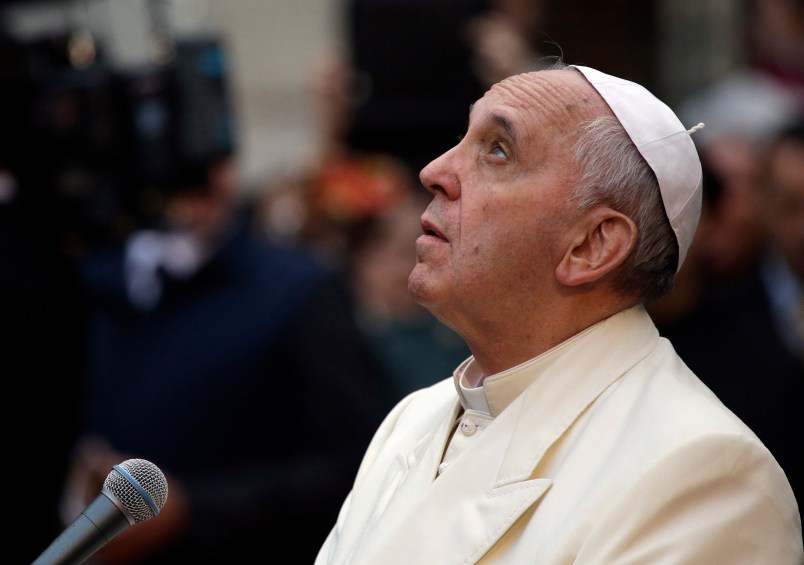This is a time of year that is often difficult for liberal Christians in this country. We have to listen to the inane chatter about a “war on Christmas” that makes department stores spiritual battlegrounds. We are treated with the annual secular media effort to characterize contemporary Christianity, in which mainline Protestantism barely exists as a dying phenomenon, liberal Catholics are “cafeteria Catholics” who aren’t serious about their faith and angry conservatives define the Gospel as being about the restoration of 1950s sexual mores. And we are overwhelmed, like all Americans, with the conflation of the Feast of the Nativity with an economically crucial celebration of greed and guilt.
This year there are indeed tidings of great joy — or at least intimations of change — that call into question the usual identification of American Christianity with monolithic and triumphant Christian right.
The first and most obvious is the sudden and surprising change of tone and emphasis introduced by Pope Francis. While liberal Catholics (and secular observers) who think major doctrinal positions opposing abortion or contraception or ordination of women are on the horizon will likely be disappointed, there is no question this Pope has instantly challenged the suppression of traditional Catholic social and economic teachings in favor of a culturally counterrevolutionary agenda on sexuality and gender. Now it is conservative Catholics who must wonder if they are picking and choosing from an ecclesiastical cafeteria of Church teachings. The alliance of the U.S. Conference of Catholic Bishops with conservative evangelicals in a battle for “religious liberty” against the Obama administration’s health care policies is in danger of collapsing. And now it’s not only liberal Catholic politicians who have to think twice about the possibility of criticism from the hierarchy, but also the Rick Santorums of the world who have championed laissez-faire capitalism as a virtual article of faith while accusing liberal Catholics and Protestants of conspiring with non-believers to rid America of Christianity.
Suffice it to say that Francis has made it vastly more difficult to identify religious orthodoxy with political conservatism. And even more surprisingly, there are similar stirrings among conservative evangelical Protestants.
The largest institutional bulwark of the Protestant wing of the American Christian right has long been the Southern Baptist Convention (SBC), and its chief spokesman on political matters was, for a quarter-century, Richard Land as chairman of the SBC’s Ethics and Religious Liberty Commission (ERLC). Land was a crucial figure in trading the SBC’s tradition of militant church-state separatism for a mess of theocratic pottage, and became a major power broker in conservative-movement and GOP politics (indeed, he was part of a group of conservative evangelical leaders who endorsed Rick Santorum for president in 2012).
Like Pope Francis, Land’s successor, Russell Moore, has not sought to challenge traditional teachings on cultural issues. But he’s made no bones about the need to abandon savage culture-war tactics, and to withdraw Baptists from any sort of reflexive alliance with the Republican Party beyond individual issues. And from being a reliable outpost of Christian right united front politics, the ERLC is now questioning major Christian right shibboleths. Its new communications director, Joe Carter, is a harsh critic of David Barton, the “historian” who has tutored a whole generation of conservative evangelicals in Christian Nationalism, the belief that the Founders intended America to become a missionary nation under a scripturally determined set of immutable policies.
There is even good news for liberal Christians on the demographic front, which must come as a shock to those who have for years assumed the only vibrant and growing elements of Christendom are conservative in doctrine and politics. The growth of agnosticism and atheism among American “millennials” has received enormous recent attention. But the latest survey of American religious attitudes by the Brookings Institution and the Public Religion Research Institute also found that among the majority of millennials who do have a religious identity, 38 percent self-identify as religious moderates, 23 percent as religious progressives, and only 17 percent as religious conservatives. The median age of religious progressives is 44, and for religious conservatives is 53. The idea that non-conservative Christianity is outmoded is itself outmoded.
Do any of these green shoots indicate that Christian right triumphalism is going to be replaced at some point in the foreseeable future by Christian Left triumphalism? Of course not. And it shouldn’t, even if it were possible. In the spirit of American pluralism, American Christians should hope for a day when believers and unbelievers alike debate political and cultural issues on an even landscape of respect and civil discourse, with no one claiming divine authority for this or that funding level for this or that program or this or that health care scheme. The much-maligned liberal Christian Barack Obama was speaking for this very old idea in his 2009 commencement address at Notre Dame when he spoke of doubt and humility about divine intentions–what was once called “the fear of God”–as essential to faith itself.
For liberal Christians, that very absence of self-righteousness is what makes it possible not only to keep faith with Americans of different or of no supernatural beliefs, but just as important, to keep communion with our fellow Christians who are convinced this political party or that issue position is The Way. This Christmas it may perhaps be easier to look across the pews and recognize each other as seekers after truth rather than its exclusive possessors.
Ed Kilgore is the principal blogger for Washington Monthly’s Political Animal blog, Managing Editor of The Democratic Strategist, and a Senior Fellow at theProgressive Policy Institute. Earlier he worked for three governors and a U.S. Senator. He can be followed on Twitter at @ed_kilgore.






